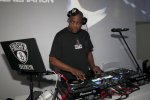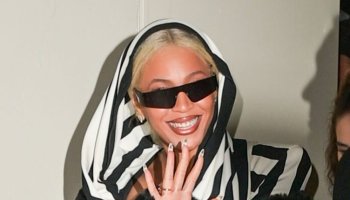Hip-Hop Wired: I understand you’re of Puerto Rican descent. Does that culture play a role in your way of life, in your music?
Nitty Scott: Yes, Black and Puerto Rican. I’m a little mixed and I think it definitely influences my perspective as a minority. There are specific struggles and specific issues within both those cultures that I’m definitely aware of and I talk about and often fight against.
It definitely plays a part in the art. Both of my parents influenced me a lot, musically. My father, who’s from New Orleans, is really Southern and wholesome. He always had me listening to very classic, Soul records –– Marvin Gaye, Harold Melvin & The Blue Notes, Sam Cooke. My mom is from Puerto Rico and raised in Jersey, so she has her own flavor about her. She was always putting me on to La India and Marc Anthony, Celia Cruz and the like. It’s all a part of my upbringing for sure.
Hip-Hop Wired: Did you ever feel the pressure or need to box yourself?
Nitty Scott: Absolutely. When I first came out, I so badly felt like I needed to be accepted as a real spitter and a skill-based lyricist. I think because of that, I sort of really tried to perpetuate this Hip-Hop image, because it’s what I thought I was equipped to represent and what I thought people wanted. But I don’t want to be limited to that, as the ‘90s girl that gets on boom bap beats. I don’t want to box myself into that corner, and this recent album and recent changes, that is me kicking myself out of that box and saying “ok, that was me at one phase at my artistic evolution, and now I’m in another chapter and I’m going to continue to evolve and change.’
The latest material that I’ve been putting out really helped to give me permission in a way to be whoever I want. I really don’t want to perpetuate being one way or the other so that people can digest me. I’m a human being, I very multilayered, I have different sides to me. I’m moody. My favorite color can change tomorrow and that’s ok. That’s what I want my music to reflect from this point forward.
Hip-Hop Wired: What did it mean for you to headline who’s next at SOBs?
Nitty Scott: Everyone knows SOBs is legendary. I had rocked at SOBs before, but I was headlining that night for the Hot 97 Who’s Next showcase. It was definitely a milestone for me, especially as someone who came to New York City as a transplant at 17 with a plan and a mission and it was totally manifesting itself, in that moment. I was on a legendary stage, being cosigned by the hottest urban station in New York, literally saying that I am next. The turnout was great, the show was great, I got to perform some new records off the album and I think people really got to experience this new and improved version of Nitty Scott.
Hip-Hop Wired: What’s your outlook on the current state of Hip-Hop?
Nitty Scott: I still feel there’s a lack of balance and diversity and representation within the mainstream. Mainstream is one type of sound, one type of message, one type of aesthetic. But at the same time, I think there’s a lot of great stuff happening in Hip-Hop. If you want to hear lyrical music, music with substance, women that you can maybe relate to on a more personal level, it’s out there. A lot of people talk about what’s wrong with Hip-Hop and what’s not being represented, which is definitely an issue, but at the same time, while it might not be on the radio or in your face, it’s definitely out there. If you’re looking for it, it exists. We have the Internet, we have access to these things. You don’t have to be limited to what you’re being spoon-fed. Commercial Hip-Hop does not represent all of Hip-Hop. As fans and consumers we need to exercise our powers a little more.
Hip-Hop Wired: Do you think female rappers have a legitimate presence in the game right now?
Nitty Scott: Yes and no. The women the industry chooses to get behind –– it’s all a formula. It’s the very hyper sexualized, almost hyperbolized female. It’s not to say that can’t exist or whatever, but as far as that mainstream representation, I really think that people are waiting for a woman that represents other than what’s being put out right now and for her to actually get a solid push and a release. But we’re definitely out here. There are definitely some really established girls out here and new ones popping up all the time. It’s honestly all about penetrating this stigma that you have to represent one specific thing to be popular, fit one specific aesthetic. It’s one of the barriers that I’m personally trying to break, and I see a lot of other women trying to break as well.
Hip-Hop Wired: How do you feel about Forbes saying that a white woman is taking over Hip-Hop (referring to Iggy)?
Nitty Scott: That statement is completely baseless and unfounded. I don’t know where it came from. I agree with the rest of the earth that the whole comment was just ridiculous. Being successful and having a successful release does not constitute running an entire culture. And in order to run Hip-Hop, you gotta be Hip-Hop, which shorty is not. So, we’ll leave it at that.















